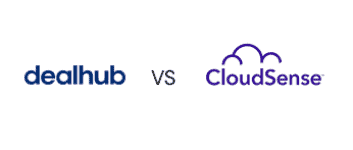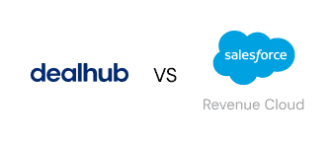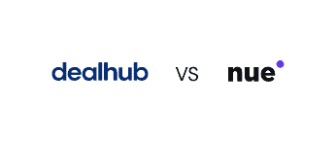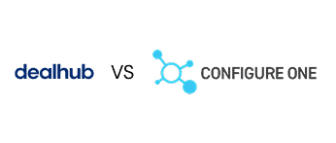Introduction
Compare DealHub CPQ vs. CloudSense CPQ
DealHub CPQ is an agentic Quote-to-Revenue platform that unifies CPQ, subscription billing, real-time usage metering, contract lifecycle management (CLM), e-signature, and automated revenue recognition in a single system. Known for its intuitive interface and AI-assisted quoting and pricing, DealHub integrates natively with Salesforce, HubSpot, and Microsoft Dynamics, offering CRM flexibility beyond Salesforce-only solutions. The platform’s no-code workflow automation and guided selling capabilities help telecommunications and enterprise sales teams navigate complex pricing structures. Its real-time usage metering infrastructure tracks consumption across any dimension (network usage, API calls, bandwidth, storage) for accurate invoicing. DealHub’s unified architecture ensures what Sales quotes is exactly what Finance bills and recognizes, eliminating reconciliation overhead between quoting, billing, and revenue recognition systems. This makes it particularly valuable for telecommunications companies, managed service providers, and enterprises managing diverse revenue streams, including subscriptions, usage-based pricing, project services, and equipment sales with maintenance contracts.
CloudSense CPQ, on the other hand, is a powerful solution tailored for industries with highly complex sales processes, such as telecommunications, media, and utilities. Built natively on Salesforce, CloudSense CPQ leverages the CRM’s capabilities to provide deep customization and automation for product configuration, order management, and pricing rules. The platform is particularly strong in handling usage-based pricing models and multi-layered approval workflows, making it ideal for businesses that require extensive scalability and industry-specific functionality. CloudSense also offers advanced catalog and contract management features, ensuring enterprises can manage their entire sales lifecycle within a single ecosystem.
Product Overview
Overview of each CPQ Solution
Defining DealHub CPQ
DealHub’s unified revenue platform helps B2B companies, including telecom, media, managed services, and enterprise technology, automate complex revenue operations from initial quote through billing, usage tracking, and revenue recognition. The platform handles diverse revenue streams common in telecom and media: bundled service packages combining voice, data, and cloud services; usage-based billing for network consumption, bandwidth, and API access; subscription management for recurring services; equipment sales with maintenance contracts; and hybrid models combining multiple pricing structures within single customer relationships.
DealHub enables sales teams to quickly assemble accurate quotes combining infrastructure services, software licenses, professional services, and usage-based components. AI-powered guided selling walks reps through intricate telecom scenarios: multi-year service agreements with ramp pricing, co-terming across multiple contracts, usage tier management with overage calculations, and bundled offerings combining recurring subscriptions with consumption-based charges. Real-time usage metering tracks consumption across any dimension (e.g., network bandwidth, storage capacity, API calls, support tickets, managed service hours), enabling accurate invoicing for consumption-based and hybrid pricing models.
Advanced filtering capabilities help telecom sales teams quickly surface critical deals: upcoming service renewals, proposals requiring technical review, high-value enterprise opportunities, or quotes needing pricing approvals. Customizable filters with visual cues enable instant recognition of deal status across complex sales cycles involving multiple stakeholders and technical requirements.
DealRoom creates interactive digital sales rooms that centralize technical specifications, service level agreements (SLAs), network diagrams, compliance documentation, and contracts in branded workspaces where IT teams, procurement, and stakeholders review and approve in real-time. Deal Talk enables deal-specific messaging directly within proposals, streamlining collaboration between sales, engineering, and deal desk teams. DealStream provides real-time visibility showing who’s viewing service specifications or pricing options, helping telecom sales teams follow up strategically.
Beyond quoting, DealHub automates the complete service lifecycle: automated billing with proration for mid-term service changes, intelligent renewal management with usage-based adjustments, contract amendments for service upgrades, and real-time revenue recognition (ASC 606/IFRS 15 compliant) ensuring financial accuracy. Bidirectional sync with CRM systems (Salesforce, HubSpot, Microsoft Dynamics) and ERPs (NetSuite, SAP) keeps customer data, service configurations, and usage records synchronized, while maintaining single-source-of-truth accuracy for telecommunications revenue operations.
Defining CloudSense CPQ
CloudSense CPQ is a Salesforce-native Configure, Price, Quote and Order Management System purpose-built for B2B telecommunications, media, and technology companies managing complex enterprise sales. Now part of the TelcoDR Group through acquisition by Skyvera, CloudSense’s Telco One platform delivers end-to-end commercial order management from product configuration through order fulfillment.
CloudSense excels at telecommunications-specific scenarios that traditional CPQ systems struggle to handle: configuring complex network solutions across multiple sites, bundling voice, data, and cloud services with sophisticated pricing rules, managing MPLS IPVPN solutions and managed services at enterprise scale, and orchestrating multi-tier partner/reseller relationships with channel-specific pricing. The platform’s centralized product catalog manages all commercial offerings (products, services, pricing structures, and business rules) from a single interface, enabling B2B communications companies to rapidly introduce sophisticated solutions and product bundles without extensive IT involvement.
Quick Quote capability generates quotes for enterprise telecommunications deals in minutes, while the platform’s Compatibility Rules Service (CRS) ensures configured products work together by providing visual indicators when items are incompatible—critical for complex network infrastructure sales. CloudSense’s advanced deal scoring analyzes customer data and configuration requirements to estimate deal profitability and conversion likelihood, helping sales teams prioritize high-value opportunities and optimize pricing strategies for telecommunications accounts.
Order management and fulfillment orchestration automate the complete order lifecycle from quote acceptance through service delivery, reducing manual submissions and increasing operational efficiency. The platform seamlessly integrates subscription management, vendor onboarding, procurement, and automated renewal processes with personalized customer offers, supporting the recurring revenue models standard in telecommunications and managed services businesses.
Built natively on Salesforce, CloudSense provides deep CRM integration that leverages Salesforce’s infrastructure, AI investments, and continuous innovation, though this Salesforce-only architecture limits flexibility for organizations using alternative CRMs. While CloudSense delivers robust capabilities for telecom complexity, users report that implementations can be lengthy, and the platform’s depth creates steeper learning curves compared to some alternatives.
Product Features
Comparison of Key Features
DealHub and CloudSense serve different organizational needs with distinct platform architectures and capabilities.
DealHub differentiates through its unified Quote-to-Revenue approach that eliminates separate billing and revenue recognition systems, operating on a single data model where quotes, billing schedules, and financial reporting stay automatically synchronized. The platform supports multiple go-to-market motions (sales-led, product-led growth, self-service) and diverse monetization models—subscriptions, usage-based, hybrid structures—within one system, with native integrations across Salesforce, HubSpot, and Microsoft Dynamics providing CRM flexibility. Real-time revenue dashboards deliver live ARR, MRR, and churn visibility without month-end reconciliation, while the no-code environment enables revenue operations teams to adapt pricing strategies and launch new offerings without IT bottlenecks or consultant dependencies.
CloudSense specializes in telecommunications-specific complexity that general CPQ systems can’t handle: multi-site network configurations across thousands of locations within single quotes, MPLS IPVPN and managed services solutions, and multi-tier partner/reseller orchestration with channel-specific pricing rules. Built exclusively on Salesforce with deep native integration, CloudSense leverages the CRM’s infrastructure but limits organizations to the Salesforce ecosystem.
Here’s a breakdown of each product’s features:
| Feature | DealHub | CloudSense |
|---|---|---|
| Primary Focus | Agentic Quote-to-Revenue platform (CPQ + billing + usage metering + revenue recognition) | Salesforce-native CPQ and Order Management for telecommunications/media/utilities |
| Target Industry | SaaS, telecom, managed services, professional services | B2B telecommunications, media, utilities |
| Quote Creation Speed | 30 seconds for complex deals with DealDesk AI | Minutes with Quick Quote capability |
| Multi-Site Quoting | Supports multi-location deals | Specialized for thousands of sites within single quote (MPLS, IPVPN) |
| Product Configuration | Guided selling with AI recommendations and rules engine | Advanced configuration with Compatibility Rules Service (CRS) for network components |
| Pricing Model Support | Subscriptions, usage-based, consumption metering, tiered, hybrid, credits, bundles, volume discounts, channel-specific pricing | Complex telecom pricing, bundles, volume discounts, channel-specific pricing |
| Real-Time Usage Metering | Built-in consumption tracking (millions of events daily) | Usage-based pricing support (less emphasis on real-time metering) |
| Subscription Billing | Automated billing, proration, co-terming, amendments, renewals | Subscription management with automated renewal emails and personalized offers |
| Revenue Recognition | Built-in ASC 606/IFRS 15 automation with complete audit trails | Not included |
| Order Management | Quote-to-order with billing integration | Comprehensive order fulfillment orchestration from quote through delivery |
| Digital Sales Rooms | DealRoom: interactive collaboration with engagement analytics, Deal Talk, DealStream | Standard quote documents and proposals |
| Contract Management (CLM) | Full lifecycle: creation, negotiation, execution, amendments, renewal tracking | Contract management within order lifecycle |
| CRM Integration | Native: Salesforce, HubSpot, Microsoft Dynamics; bidirectional sync | Native Salesforce-only (built on Salesforce platform) |
| Channel/Partner Support | Multi-tier pricing for distributors, dealers, VARs | Reseller/partner management with channel-specific pricing |
| Product Catalog | Unified catalog with no-code configuration | Centralized product catalog managing all offerings, services, pricing, business rules |
| Approval Workflows | Multi-level with real-time Slack notifications, auto-approve rules | Automated approval workflows with routing based on deal criteria |
| Configuration Approach | AI-assisted guided selling | Salesforce-native configuration with visual compatibility indicators |
| Go-to-Market Motion Support | Sales-led growth (SLG), product-led growth (PLG), self-service | Primarily sales-led for enterprise B2B telecommunications |
| Implementation Timeline | Weeks with no-code configuration | Longer implementations (months) due to complexity and customization needs |
| Platform Architecture | Multi-CRM, API-first, unified data model (quote = bill = recognition) | Salesforce-native, leverages Salesforce infrastructure exclusively |
Customer Size
Ideal Customer Profiles
While both solutions enhance the sales quoting process, their strengths lie in different areas.
DealHub CPQ is designed for companies that need to support any monetization model or go-to-market motion, whether that’s traditional sales-led deals, product-led growth, self-service channels, or consumption-based pricing. DealHub delivers a unified Quote-to-Revenue platform that handles subscriptions, product and service bundles, tiered pricing, usage-based pricing, milestone billing, prepaid credits, committed spend, hybrid structures, and seamless transitions between models—all from a single system.
This makes DealHub ideal for mid-market and enterprise organizations seeking both efficiency and flexibility. Whether closing complex enterprise agreements with custom terms or enabling self-service signups with automated provisioning, DealHub provides the governed infrastructure to support every revenue motion without operational chaos.
CloudSense CPQ, in contrast, focuses on businesses with intricate pricing models and regulatory requirements in specialized industries. It offers a highly customizable approach well-suited for organizations with complex product configurations, multi-tiered contracts, and multiple stakeholders to manage. Its ideal customers are telecommunications, utilities, and similar sectors with industry-specific compliance needs.
Customer Support
Support Features & Resources for Each Solution
At DealHub, thorough customer support begins with onboarding and implementation. Its team of experts assists new customers in setting up and integrating the solution and educates sales reps and managers on using it efficiently. Continued support post-purchase drives software adoption and minimizes the chances of any problems arising after implementation.
CloudSense is a specialized tool. With extensive experience in telecommunications, media, and utilities, its in-house professionals are experts at CPQ implementation in these domains. CloudSense also offers customer support and training to help its customers get the most out of its software.
Pricing
Breakdown of Pricing Options
Pricing is a big factor when deciding which CPQ software to choose. While each company has its own pricing model, some general trends are helpful to explore.
DealHub’s pricing is quote-based but starts at around $50. If customers want an accurate quote, they should contact the team directly.
CloudSense CPQ is completely quote-based with no pricing information available on its website. Pricing depends on the functionality and level of customization needed for each customer’s product configuration, so prospective customers to contact CloudSense directly for a quote.
Here’s a quick rundown of the costs associated with each product:
| DealHub CPQ | CloudSense CPQ | |
|---|---|---|
| Product Pricing | CPQ+: Contact sales CPQ + CLM: Contact sales Quote-to-Revenue: Contact sales | Contact sales |
| Implementation Fees | One-time implementation fee | One-time implementation fee |
| Additional Licenses | No additional license fees | Additional licensing for Salesforce AppExchange add-ons |
Summary
Considerations for Choosing Between the Two Solutions
When selecting between DealHub and CloudSense, businesses should consider their industry, sales complexity, and integration needs.
DealHub CPQ is ideal for companies seeking a user-friendly, no-code solution with strong guided selling capabilities and seamless CRM integrations, including Salesforce, Microsoft Dynamics, and HubSpot. Its intuitive, customizable interface and quick implementation make it a great choice for mid-market and enterprise sales teams looking to streamline complex pricing and quoting without requiring extensive IT involvement.
CloudSense CPQ, on the other hand, is best suited for industries with highly specialized sales processes, such as telecommunications, media, and utilities. Built natively on Salesforce, it offers deep customization for complex product configurations, multi-layered approval workflows, and usage-based pricing models. Businesses that require extensive order management, contract lifecycle automation, and multi-currency quoting will find CloudSense particularly beneficial, especially if they already rely on Salesforce as their primary CRM.
Ultimately, the choice between DealHub and CloudSense depends on the level of customization and industry-specific functionality a business requires. Companies that need an agile, easy-to-use CPQ solution with broad CRM compatibility may prefer DealHub, while those operating in regulated industries with intricate pricing structures and large-scale order management needs may find CloudSense a better fit.
FAQs
Frequently Asked Questions
The best way to evaluate your needs is to look at your current sales process and identify which tasks can be automated or improved with the help of CPQ software. If you have a lot of complex product configurations, then it’s likely that you need a tool like CloudSense to streamline order fulfillment. If you need a more repeatable process to scale, DealHub will fit better into your workflow.
DealHub CPQ allows for guided selling and error-free quoting. The sales process is streamlined through approval workflows, and the software integrates easily with Salesforce CRM. Through API, it also integrates with enterprise data sources and back-end systems to provide a seamless customer journey.
CloudSense is built on microservices as a part of the Salesforce ecosystem. Although it is a separate software altogether, it offers users a way to generate quotes while working in the Salesforce environment. CloudSense also offers customer support, training sessions, and post-implementation services to ensure the software is being used effectively and customers are taking advantage of its capabilities.
Being built on Salesforce means that CloudSense is a part of the Salesforce family. It uses the same microservices architecture but is not directly connected to Salesforce. This allows CloudSense users to take advantage of CPQ functionalities individually while remaining in their sales environment and leveraging the strength of the Salesforce platform. For non-Salesforce customers, CloudSense still offers CPQ capabilities through its own platform.

Rhonda Bavaro excels in boosting SaaS companies’ growth through innovative content marketing, thriving in the dynamic sales tech industry amidst evolving technologies that drive revenue acceleration.








